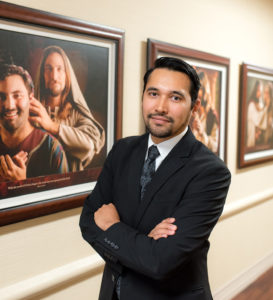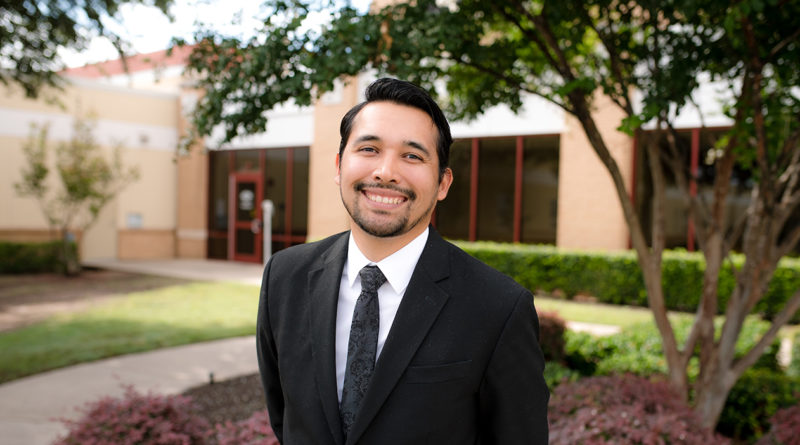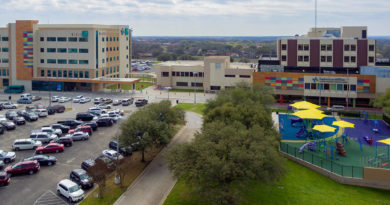Blending faith & psychology
Esteban Cortez helps Metroplex staff connect with patients
By Catherine Hosman
Photography by Justin Borja
Rare is the person who walks into a room and radiates a kind of light generated from genuine caring and kindness.
Esteban Cortez is one of those people.
 Cortez is the Clinical Mission Integration Manager (CMI) at Metroplex Health System Killeen, part of the Adventist Health System.
Cortez is the Clinical Mission Integration Manager (CMI) at Metroplex Health System Killeen, part of the Adventist Health System.
The major tenet of Adventist Health System is to extend the healing ministry of Christ throughout all of its medical facilities in the nation. In an effort to encourage medical professionals to connect to their patients on a spiritual level and provide a holistic approach to healthcare, the organization created the CMI position.
In this position, Cortez meets with medical professionals individually and teaches them how to connect with their patients on a spiritual basis.
“It’s about self-denial, taking oneself out of the picture and focusing on their patient’s needs,” says Cortez, who holds a bachelor’s degree in psychology from Pacific Union College in Angwin, California, and a medical missionary certificate from the Wildwood College of Health Evangelism in Wildwood, Georgia. “If I go to you, I want something for myself. But if I come to you and give you my full attention, it’s all about you.”
As the CMI for Metroplex Health System, Cortez also helps medical professionals meet some of their own spiritual needs.
“I help patients by proxy. As I visit staff members and doctors I tend to ask them if they have a need for prayer or if they need a listening ear,” says Cortez, a member of the Seventh Day Adventist Church. “CMIs are more of a catalyst to doctors and staff. By being loving and supporting to staff and doctors, now they can go help their patients.”
Caring for the whole person—mind, body and spirit—has been a value of Adventist Health System since its inception in 1866 in Battle Creek, Michigan. The Spiritual Wholeness Screening Cortez shares with practicing medical professionals today teaches them how to ask their patients leading questions, such as: Do you have someone who loves you and cares for you? Do you have a source of joy in your life? Do you have a sense of peace today?
An unlikely future
Cortez, 35, grew up on the mean streets of East Palo Alto, California, where the weather was beautiful and the grass was always green. It was also known as the murder capital of the nation. He was one of four siblings born to Saul and (the late) Arcelia Cortez.
“East Palo Alto is a small subdivision,” he says. “Most people were from lower middle class to poverty.”
As children, they were allowed to go outside and play, but only while supervised. He remembers an incident when he was outside with his older brother, Zuri, who was riding a bicycle. “Two kids came up to Zuri, knocked him off his bike and stole it,” says Cortez. The bike was later reclaimed by a neighbor who knew the thief and returned the bike.
Drive-by shootings were also a hazard. One evening as the Cortez family slept, a car drove by, shooting at the house across the street. “The house had bullet holes,” he says. “We only saw the aftermath when we woke up. Those were the kinds of things that happened at that time.”
Raising four children with Christian values in East Palo Alto was challenging for Cortez’s working parents who understood the temptations of the outside world.
“The most they could do was instill values based on Christian beliefs; to do the right thing,” he says.
It was these values that inspired Cortez to serve his community and be a part of the solution, not the problem.
From the age of 18 to 23, Cortez worked in childcare at the local YMCA, taking care of children from 3 months to 5 years old, and later at the Boys & Girls Club of America as an after-school teacher. It taught him patience, how to deal with children of different ages and how to balance the needs of everyone—skills that would serve him well in his career.
“I would be feeding one child, have a child crying here, holding a 3-month-old here—how do I delegate? How do I find a solution?” he says.
He says that he learned patience and empathy when caring for the children at the YMCA.
“If I see a child in trouble, I ask myself what can I do to help them.”
At the Boys & Girls Club, however, older children presented a different kind of challenge.
“Some kids talk, others are resistant,” Cortez says. “Some are too smart for the curriculum. How could I be a challenge to them, find out what makes them engage, what do they love to do? It’s not only about having fun but learning something at the same time.
“I gained an understanding of the different personality types. Fourth graders are finding out who they are and how to get away with something. Most of my students lacked discipline because of their home life. It’s because of this that most acted out,” he says. “I didn’t want to be another adult that raised their voice at them but wanted to be one that loved and took the time to understand them. It’s about finding balance between being authoritative and showing them love, compassion and grace.”
Bound for Texas
One by one the Cortez family relocated to Texas. Older brother Zuri, a veteran who served two years in Iraq, lives in Pflugerville with his family. His younger sister, Priscilla, lives in Austin and his youngest brother, Amisadai, lives in Round Rock. His father, Saul, lives in Elgin in the home he shared with his wife, Arcelia.
Keeping the family together is a legacy to his mother, who passed away in October 2017.
Cortez moved to Texas in 2012 and worked in various teaching positions where he was able to use his psychology and pastoral skills. In 2016 he became the assistant dean at Ozark Adventist Academy in Gentry, Arkansas. When his mother became ill in the summer of 2017 he came back to Texas to care for his parents.
He chose to stay in Texas, close to his family, but finding a new position that fit his qualifications was difficult, which made times trying. One day while attending church he learned about a new position from former Metroplex Hospital CEO Carlyle Walton. Cortez believes it was divine intervention.
“We attended the same church. He was sitting in the pew in front of me one Saturday when he turned around and spoke,” says Cortez, who shares his life with his wife, Catherine, and infant son, Micah. “He said he had a great fit for me at the hospital.”
Cortez sent his resume to Walton and was granted an interview.
“I asked him what he saw in me and he said, ‘The values you hold, by how you behave, how you treat your family, your wife, patience with your son,’ he saw those qualities,” Cortez says. “It was a miracle.”




